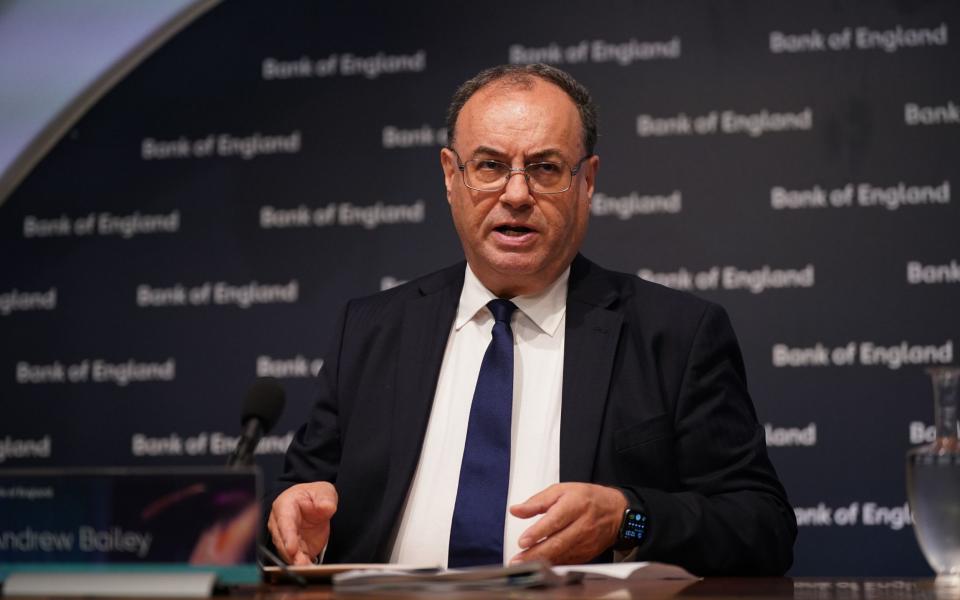Bailey could be ordered to abandon inflation target in radical overhaul of Bank of England

Andrew Bailey would be told to abandon the Bank of England’s 2pc inflation target under a radical plan to reform its mandate and boost the economy.
Mr Bailey, the Bank's Governor, may be ordered to target nominal GDP in future - the size of the economy in cash terms - instead of seeking to keep inflation at 2pc, under plans being floated by allies of the Tory leadership frontrunner Liz Truss.
This would be a significant departure from current rules. The proposals are thought to be one of several options being considered, with talks at a very early stage.
Mr Bailey vowed not to quit as the Bank's Governor on Friday as Kwasi Kwarteng, the Business Secretary, warned that "something has gone wrong" at Threadneedle Street.
Inflation has surged to its highest level in decades and the Bank is predicting a recession, with price rises now expected to peak at 13.3pc later this year.
It came as house prices suffered their first fall in 13 months according to Halifax, with a drop of 0.1pc between June and July.
Huw Pill, the Bank's chief economist, insisted in an interview with Bloomberg that the dip would not turn into the kind of "dramatic downturns we’ve seen in the past".
Liz Truss has pledged to closely examine the Bank’s mandate if she is elected Prime Minister, as a source accused Mr Bailey of doing “b----r all for a long time” to rein in rising prices.
The Telegraph has been told one possibility is that the Monetary Policy Committee’s (MPC’s) longstanding 2pc inflation target could be scrapped altogether and replaced with a new instruction to monitor nominal GDP instead.
This “Nominal GDP Targeting” system would mean the Bank would adjust interest rates to control the amount of spending in the economy, rather than inflation itself.
Nominal GDP growth effectively takes into account both an expansion in economic output and inflation. Economists have long debated whether it would be a more effective target for central banks seeking to smooth out economic peaks and troughs.
The Bank of England and US Federal Reserve both considered introducing nominal GDP targeting in response to the financial crash but decided to continue focusing on inflation.
The Governor yesterday defended Thursday’s decision to increase interest rates by 0.5 percentage points – the biggest jump in 27 years.
Speaking to the BBC Today programme, he said: “We don’t make policy with the benefit of hindsight.”
The Governor added that he would “challenge anyone sitting here a year, two years ago, to say there will be war on Ukraine and it will have this effect on inflation”.
Mr Bailey said he "made a commitment" to serve eight years at the helm. He said: "It's very important to the Bank that there's stability in terms of the term of the Governor."
However, Mr Kwarteng, the Business Secretary, suggested the Bank could require wholesale reform after it projected it would miss its own target by 11 percentage points.
He said: “I think there is an issue about how the Bank is operating because clearly, if I say to you 2pc is your target, and you say to me, ‘Well, actually it’s going to hit 13pc’, I would quite rightly say something’s gone wrong.”
Mr Bailey could also be told to increase the amount of “forward guidance” given by the MPC when it announces interest rate decisions, giving the market more certainty about how it will behave in the future.
For example, it could follow the Fed in issuing a chart showing the predicted future path of interest rates.
There is widespread frustration among allies of Ms Truss, the Foreign Secretary, including in the Treasury, that the Bank has been unable to prevent rising inflation since the invasion of Ukraine.
A source said: "It might be good for the Bank to give markets a bit more information about how it plans to act in future, given it has been slow to raise interest rates in this case."
Another ally added: “If you have a target that says 2pc and it’s 13pc and you have done bugger all for a long time and you have taken the path of least resistance, that is not wonderful in terms of getting your marks at the end of the year.”
Ms Truss was yesterday warned by one Cabinet colleague not to interfere with the Bank’s independence on interest rates.
They said: “The independence of the bank has to be a given here.
“I think it’s a credibility issue internationally.”
The minister said Ms Truss should also avoid lowering the inflation target, which had been touted by some Whitehall insiders as a possible strategy to encourage the MPC to tighten its policy.
They said: “If it’s changing the target, good luck with that. We are going to have a hell of a battle to get it back in the range in the next few years.”
Sources close to the Foreign Secretary denied that she was considering removing the Bank’s independence but pointed to its recent performance as evidence the mandate required reform.

 Yahoo Finance
Yahoo Finance 